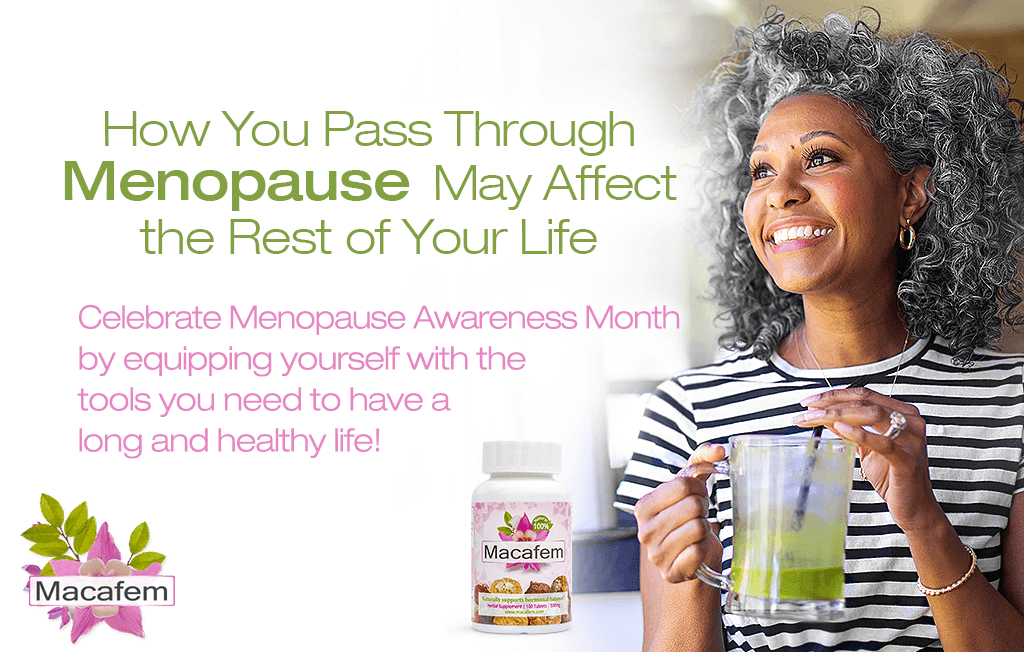How You Pass Through Menopause Can Affect the Rest of Your Life
Many women have a negative preconception of menopause way before the transition even begins. They often push through dreadful symptoms without searching for any reprieve. What they may not know is that the way they go through menopause may influence their health in the years to come. Celebrate Menopause Awareness Month with Macafem by equipping yourself with the tools you need to live a long and happy life!

Your Heart Health
Throughout women’s reproductive years, estrogen plays several key roles, one which is protecting against cardiovascular disease. After menopause, however, estrogen levels drop, causing women to face new, serious health risks. They’re often worsened by a more sedentary lifestyle, high cholesterol, and midlife weight gain.
The best way to counteract these risks and live a healthy life after menopause is to make small, consistent changes in your eating and exercise habits as well as addictions (e.g., smoking). Start as soon as you can and stay on track. Your heart will thank you for it.
Your Mental State
Mental health issues are the less-talked-about symptoms of menopause. It’s not only because of the stigma around mental health. It’s also due to the fact that most women associate the transition mainly with physical discomforts (e.g., hot flashes), rather than psychological or emotional ones. Nothing father from the truth.
From mood swings and irritability to depression, anxiety, and panic attacks, menopausal women can experience it all. While the risk of mental health issues tends to return to normal up to four years after menopause, seeking help for them right away can prevent them from intensifying and persisting into postmenopause.
Your Social Bonds
The debilitating and often embarrassing menopause symptoms may push women away from social interactions. After all, drowning in a hot flash at brunch, having leakage accidents when visiting friends, or being on edge with co-workers are a hard pill to swallow.
Studies have found that that women with strong social networks have a more positive attitude towards menopause, higher levels of physical activity, and lower rates of depression. Maintaining social bonds has also shown to lead to a healthier, longer, and better-quality life in comparison to living in isolation.
Your Sex Life
Yes, sex after menopause tends to be different from what it used to be. Yes, women commonly report vaginal dryness and pain during intercourse. Yes, many lose interest in sex altogether. But these difficulties are by no means permanent. The faster you take on a proactive approach, the quicker you’ll be back on track with your sex life.
Start by changing how you think of menopausal sex. Instead of comparing it to your youthful exploits, try to find yourself in what’s different about intimacy. Ease the pain with lubricants, talk openly with your partner about your mutual needs, and don’t be afraid to spice things up with foreplay, sex toys, and romantic dates!
Menopause Awareness Month is an invitation to check in with yourself and make sure you’re on the right track, ask for help if needed, and make small adjustments to make your efforts long-lasting. It’s also a great time to check on other women in your circles and re-assure, guide, and support them on their path. After all, we’re in this together!
Cleveland Clinic. (2021). Postmenopause. Retrieved September 7, 2022, from https://my.clevelandclinic.org/health/diseases/21837-postmenopause
Healthy Women.org. (2015). September is Menopause Awareness Month. Retrieved September 7, 2022, from https://www.healthywomen.org/your-health/menopause-aging-well/september-menopause-awareness-month
International Journal of Environmental Research and Public Health. (2020). The Relationship between Health Status and Social Activity of Perimenopausal and Postmenopausal Women (Health Status and Social Relationships in Menopause). Retrieved September 7, 2022, from https://www.ncbi.nlm.nih.gov/pmc/articles/PMC7696753/
Johns Hopkins Medicine. (n.d.). Can Menopause Can Depression. Retrieved September 7, 2022, from https://www.hopkinsmedicine.org/health/wellness-and-prevention/can-menopause-cause-depression

